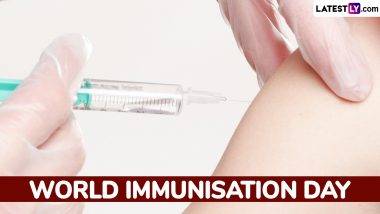As we enter into the week spanning from April 24 to April 30, 2024, we embark on a crucial global health event or campaign known as World Immunisation Week. Every year, the event is observed from April 24 – 30. This year too, World Immunisation Week 2024 will be observed from April 24 – 30. This yearly event serves as an important reminder of the key role immunisation plays in protecting both individuals and communities from infectious diseases. It emphasises our collective duty to ensure universal access to life-saving vaccines, thereby encouraging and creating a healthier, safer, and more resilient world for future generations. From date, history, theme and significance, here’s all you need to know about World Immunisation Week 2024. World Immunisation Week: 4 Vaccines That Should Be on Every New Born’s Chart.
World Immunisation Week 2024 Date
World Immunisation Week takes place every year on the same dates. World Immunisation Week 2024 is observed from April 24 – 30, 2024. It emphasises on the importance of immunisation during these designated days.
World Immunisation Week 2024 Theme
The theme for World Immunisation Week 2024 is 'Humanly Possible: Immunisation for all.' This theme emphasises the commitment to making immunisation accessible to every individual, regardless of geographical location, socioeconomic status, or other such barriers.
World Immunisation Week History
World Immunisation Week traces its origins back to 2012, when the World Health Organisation (WHO) started this awareness campaign on a global scale. Since its inception, it has been observed every year to educate everyone on the significance of vaccination across all age groups, from children to the elderly. World Immunization Week: Do You Need to Get a Tetanus Shot Only After Injury Caused by a Rusted Item? 5 Facts About Tetanus Vaccine That You Should Know Of.
World Immunisation Week Significance
World Immunisation Week is very important in terms of public health for many reasons. Firstly, it acts as a critical tool in disease prevention. Immunisation has prevented millions of deaths all across the world from diseases like measles, polio, tetanus, and influenza. Moreover, vaccination not only keeps people safe but also creates herd immunity, or community immunity. By immunising a major portion of the population, the transmission of infectious diseases is stopped, offering protection to vulnerable people who cannot receive vaccines due to medical reasons.
In addition, World Immunisation Week emphasises the vital importance of fair and equal access to vaccines globally. It highlights the necessity for governments, health organisations, and communities to collaborate and come together to ensure the proper and widespread distribution of vaccines, leaving no one behind. In recent times, vaccine hesitancy has emerged as a significant challenge to public health initiatives. Hence, World Immunisation Week presents an opportunity to put to rest any misinformation, bust myths, and build trust in vaccines through education, outreach, and supportive efforts. World Immunization Week: Can Children Get Rashes from Vaccination? Common Side-Effects of Vaccines That You Should Know Of.
World Immunisation Week is a reminder of the collective responsibility we, as people, have to prioritise immunisation as a fundamental requirement of public health. By promoting vaccination, promoting equal access to vaccines, and addressing topics like vaccine hesitancy, we can strive towards a healthier, more resilient global community.
(The above story first appeared on LatestLY on Apr 24, 2024 01:03 PM IST. For more news and updates on politics, world, sports, entertainment and lifestyle, log on to our website latestly.com).













 Quickly
Quickly




















